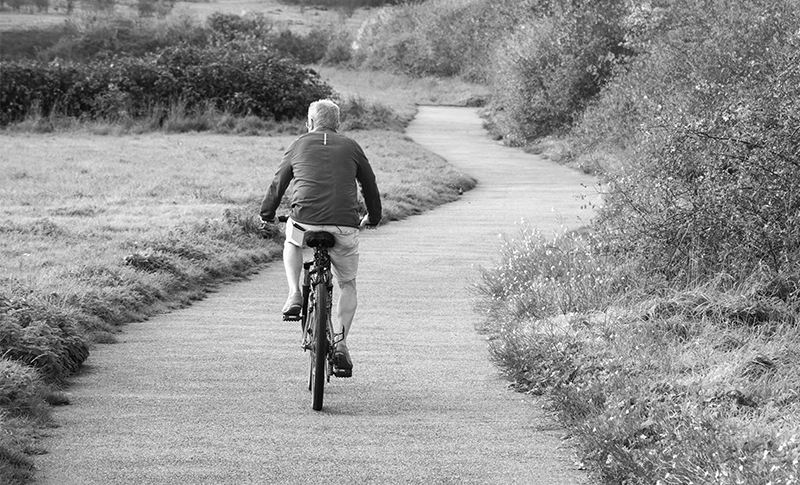The first article on the FINGER-NL study, published this summer, had no fewer than 22 authors. This study —which was originally brought to the Netherlands by WUR but is now managed by researchers at Amsterdam and Maastricht — is being carried out in five towns and cities simultaneously, including Wageningen. How do you manage such a big research project? And how do you collaborate with so many people?
Study adviser Ondine van de Rest heard about the Finnish FINGER study about 11 years ago while working as a postdoc at WUR. FINGER was a two-year randomized controlled trial in which elderly people with a high risk of dementia got a lifestyle intervention in the form of a diet, exercise, cognitive training and vascular risk monitoring. After two years, their cognitive performance was compared with that of a control group who only got general health advice. ‘The results of that study made a big impression on me,’ says Van de Rest, ‘and I wanted to start a Dutch FINGER trial. As a postdoc that meant writing applications for funding.’
That was in 2016. In the years that followed, Van de Rest submitted various applications in an attempt to get a grant to reproduce the FINGER study in the Netherlands. Her applications were rejected time and again. In 2015, Van de Rest had started work as an assistant professor and later she decided to make a career switch and become a study adviser. ‘In 2018, the Dutch Research Council made nine million euros available for the project, so together with some colleagues I reworked my original proposal and submitted a more detailed version.’ The proposal got the go-ahead in 2020. The money could be used to fund the MOCIA research consortium set up during the application procedure and in January 2022 the Dutch version of FINGER could finally start.
‘By the time we got the money from the Dutch Research Council, I was already retraining as a study adviser. There was no longer room in my diary for the research project. So it was decided to let researchers at Amsterdam and Maastricht take the lead.’ Even so, Van de Rest is still an expert on the project and involved in it because she was the person who wrote the original proposal.
Involving many centres does more than spread the workload
However, Van de Rest has positioned herself on the sidelines and tries to interfere as little as possible with the project. Does she find that difficult? ‘No, not at all. I really enjoy my job as a study adviser and I can’t say I miss the research much. Anyway, collaborating with so many partners is one hell of a job,’ she laughs. ‘It is a lot of work and it’s difficult to get everyone on the same page. I’m really impressed with how they manage to do that, and I’m pleased it’s not my task.’
Twelve hundred test subjects
The researchers wanted 1200 test subjects to take part so they could draw meaningful conclusions about the effect of lifestyle on cognitive performance. ‘You need several research centres to get that many participants,’ explains Van de Rest. ‘You won’t manage with just Wageningen. Now all the major Alzheimer’s centres are involved. The spread has more advantages than just sharing the workload: now we have participants from Maastricht, Amsterdam, Groningen, Nijmegen and Wageningen in our study, the population is more representative of what happens throughout the Netherlands.’
But there are also disadvantages to having so many people collaborating. ‘Everyone has their own ideas about how a study should be carried out, but if everyone does their own thing you won’t be able to compare the results from the various centres. All the centres have to perform the measurements and give advice in the same way, using the same protocols. It was quite a challenge to get everyone on the same page,’ says Van de Rest. ‘For example, the way we take blood samples here in Wageningen for nutritional research differs from the more streamlined infrastructure most university hospitals have for this. But it went well once we all had protocols and had got down to work.’
Moreover, the Finnish study couldn’t be simply replicated. To give an example, Finnish words were used in the memory tasks to test the cognitive performance. ‘And we use the American MIND diet in our project rather than the Finnish guidelines for a healthy diet. We also adapted the diet to suit the Dutch food culture, with cheese sandwiches and more dairy products, for instance. Those results have now been published. We also chose activities that fit better with Dutch habits, such as cycling, rather than the typically Scandinavian sports of cross-country skiing and Nordic walking.’
Long haul
‘FINGER studies are being carried out in a lot of countries and regions in addition to Finland and the Netherlands,’ says Van de Rest as she takes an enthusiastic look at the future. ‘Imagine you can combine all the data from those studies around the world and draw conclusions. Then you can make statements that are statistically solid because the results apply to a lot of people.’
At the end of August, the first 60 participants of the 240 participants in total in Wageningen completed the two-year study. With a bit of luck, the study should be completed around this time next year. ‘It is long-haul research,’ concludes Van de Rest. ‘In the meantime, publications are appearing. There is also a publication about the recruitment campaign — with leading light Erik Scherder as one of the authors — in the pipeline.’ And the results of the study as a whole? ‘I expect them only in 2027 at the earliest. But they will be unique results that could have an impact on future research and treatments around the world.’
FINGER
The acronym FINGER comes from Finnish Geriatric Intervention Study to Prevent Cognitive Impairment and Disability. The original Finnish study showed that a combination of physical exercise, a healthy diet, proper control of cardiovascular health and memory training could prevent deterioration in the cognitive performance of elderly people. After two years, the group that got the lifestyle intervention experienced a 25 per cent greater improvement in cognitive performance than the control group.

 The FINGER study researches lifestyle interventions – in the area of exercise for example – among elderly people with a raised risk of dementia. Photo Shutterstock.
The FINGER study researches lifestyle interventions – in the area of exercise for example – among elderly people with a raised risk of dementia. Photo Shutterstock. 

